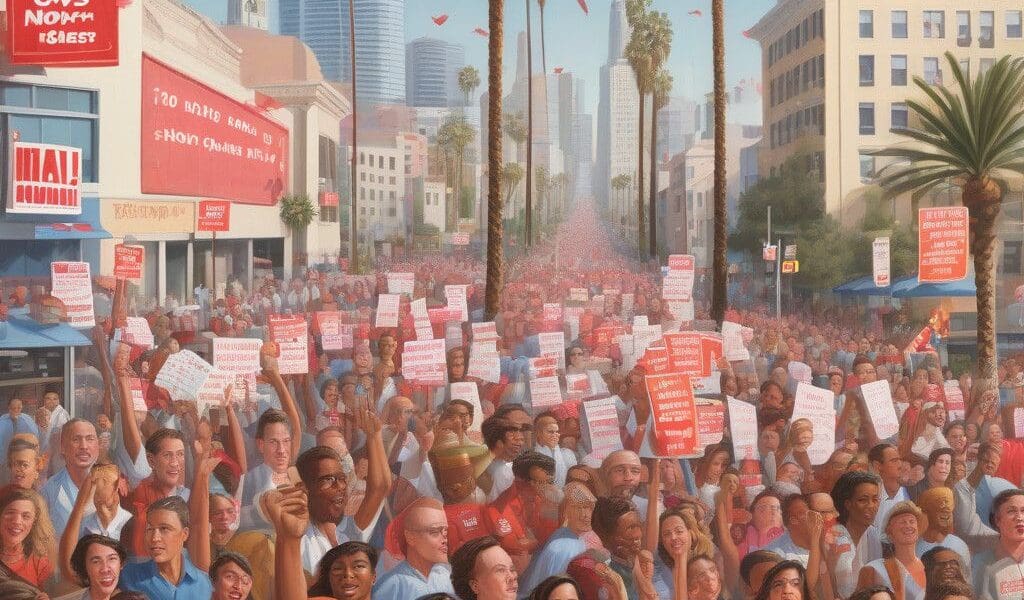In a significant labor event, CVS workers from seven Los Angeles-area pharmacy locations initiated a strike on October 18, 2024. This walkout, organized by members of the United Food and Commercial Workers (UFCW), highlights ongoing tensions between retail pharmacy employees and their corporate employers, CVS Health Corp. and Rite Aid Corp. Amidst claims of inadequate compensation and negotiations, this labor action could signal broader unrest within the retail healthcare sector.
The strikers, primarily pharmacy techs and clerks, argue that CVS has not engaged in meaningful discussions regarding their contract. Reports indicate that the average compensation for a clerk is below $20 an hour, making it difficult for many employees to afford health insurance – ironic given CVS’s position as a leading health insurance provider. For instance, one clerk shared how their paycheck barely covers basic living expenses, let alone provides for health insurance or savings.
In response, CVS maintains that the impacted stores are remaining open with non-union staff and managers. Amy Thibault, a spokesperson for CVS, expressed disappointment over the strike, underscoring the company’s efforts to keep operations running despite the disruption. However, the employees’ frustration speaks to a deeper issue: the gap between corporate profit margins and worker compensation.
Compounding the situation, Rite Aid union members in Southern California also voted overwhelmingly to authorize a potential strike. Approximately 3,500 Rite Aid workers are represented by UFCW local unions in the region. The bargaining team claims that they have faced blatant disrespect from management, with inadequate proposals presenting a serious disregard for their contributions and the company’s financial health.
In a statement, the UFCW Rite Aid bargaining team highlighted multiple unfair labor practices. These include attempts by Rite Aid to sidestep the union by negotiating directly with employees and offering incentives designed to deter them from supporting union initiatives. Such actions raise serious questions about Rite Aid’s commitment to fair labor practices, especially for a company recently emerging from bankruptcy.
The issues facing CVS and Rite Aid are not isolated incidents but are part of a broader trend affecting large pharmacy chains. Recent reports have indicated that CVS Health plans to cut approximately 2,900 jobs as it endeavors to reduce expenses. Rite Aid has also faced financial difficulties, leading to store closures in states like Michigan and Ohio, displacing many workers in the process. Meanwhile, Walgreens has announced plans to close 1,200 stores by 2025, showcasing an industry grappling with declining revenues and rising operational costs.
The labor unrest exemplified by the CVS and Rite Aid strikes is crucial for several reasons. First, it shines a light on the ongoing struggles within the retail sector, particularly in pharmacy chains, where employees feel overworked and underappreciated. The importance of advocacy for better pay and working conditions cannot be overstated, especially in an industry tasked with providing essential healthcare services.
Additionally, the ongoing labor disputes challenge the narrative that large corporations can operate profitably while neglecting their workforce’s needs. As CVS ranks as the fifth largest retailer in North America and Rite Aid stands in the twenty-sixth position, the stakes are high. The conflict raises questions about how these companies will balance the bottom line against the human element of their operations.
In conclusion, the ongoing strikes by CVS workers and the potential strike by Rite Aid employees reflect the widening divide between corporate success and employee satisfaction. As retail pharmacy chains continue to navigate financial challenges, attention must be paid to the voices of those at the frontline. Greater advocacy for fair contracts, decent wages, and safe work environments is not just beneficial but essential for these employees who are pivotal in ensuring the framework of American healthcare.












